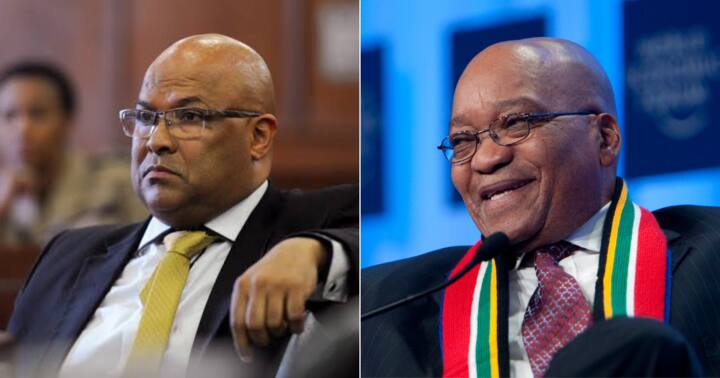Former national commissioner of correctional service Arthur Fraser has filed an affidavit saying he authorized Jacob Zuma’s release on medical parole primarily on health grounds but also because a failure to do so ”could have ignited events similar to that of July 2021”.
This came in an affidavit filed to the high court in Pretoria in reply to a review application by the Democratic Alliance, demanding that the decision to release Zuma in September be set aside, and he is returned to prison to serve the remainder of his sentence for contempt of court.
Fraser, throughout his court submission, insists that Zuma’s medical records remain classified as top secret, and says that if the applicant wished to secure the release of these, it had failed to follow the proper channels.
He states that Zuma’s health took a serious turn for the worse on 23 July, and that five days later a team of military doctors recommended that he be transferred to a facility outside the Estcourt Correctional Centre.
“I also submit that [Zuma’s] political standing had nothing to do with his placement on medical parole,” he said, in response to a legal challenge to the lawfulness of Zuma’s release on medical parole bought by the DA.
“Yes, I served under his presidency, but that is not a reason to not follow the law when dealing with the application of any other matter relating to his incarceration,” Fraser – who controversially served as the director-general of the State Security Agency during Zuma’s presidency – stated in an affidavit filed at the Gauteng High Court in Pretoria.
The need to move him from prison to hospital was reiterated as a matter of urgency on August 5, he said, and Zuma was on that day transferred to a hospital in Pretoria. While he was in the hospital, those attending to him recommended his release on medical parole.
On August 23, a report was received by the medical parole advisory board that recommended he be released because of the “clinical picture that presents unpredictable medical conditions”.
But it was not approved by the board, which held that it did not have sufficient information, according to the affidavit that repeatedly refers to the classified nature of any information pertaining to Zuma’s health.
The board still opted not to approve his release on medical parole after meeting again on September 2, despite by then having received all applicable information, Fraser says.
It decided thus, he said, because Zuma’s treatment had been “optimized” and his condition was brought under control.
Fraser said he found this striking because it was the case while Zuma spent a month under specialist care and there was no telling what would happen if he were to return to prison.
According to his affidavit, Zuma was in hospital from 5 August to 8 September, whereupon he returned to his Nkandla residence, with doctors on call to provide supervision and support. He said he could not allow the life of an inmate to be put at risk knowing that the Estcourt prison lacked the facilities to provide similar, 24-hour support.
This could have dire consequences for the department, he added, and moreover trigger events similar to those the country witnessed in July. That month, more than 350 people died as violence and looting, ostensibly sparked in protest against Zuma’s imprisonment, spread through KwaZulu-Natal and parts of Gauteng.
“Taking into consideration the events that occurred during the month of July 2021 and specifically around the period when the third respondent was incarcerated there was public unrest and destruction of property as well as the heightened ongoing public interest in any matter that related to the third correspondent,” Fraser said.
“As the then national commissioner, I instructed that all matters surrounding the incarceration and are of the third respondent, where decisions are required, that such should be done in consultation with myself.
“It is based on those circumstances that I decided to exercise my authority which was previously delegated to the HCC [head of correctional centre] in Estcourt and deal with the application for parole as submitted by the third respondent.”
Fraser counts as a close ally of the former president, and served as director-general of the State Security Agency while Zuma was in power. The Zondo commission has heard damning testimony of how he allegedly, in this role, contributed to the subversion of the intelligence service to serve Zuma’s political and private ends.
But in the affidavit he takes care to add: “This decision has nothing to do with any perceived relationship that the applicants might think I have with the third respondent.”
Zuma was sentenced to 15 months in prison in late June for denying an order by the constitutional court that he testify before the Zondo commission of inquiry into state capture. He submitted to arrest in the early hours of 8 July and was released in early September, after Fraser’s intervention.
Subsequently, Fraser’s contract was ended.
